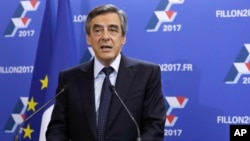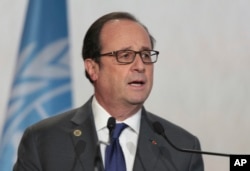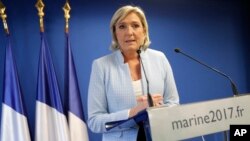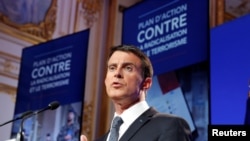France's center-right rallied behind free-market reformist Francois Fillon as its candidate for president on Monday after a snap opinion poll showed him clear favorite to beat far-right leader Marine Le Pen in an election showdown next year.
Fillon, a former prime minister who vowed to change France's "software" with an assault on public-sector spending, moved one step closer to the Elysee by securing a resounding victory over Alain Juppe in the Les Republicains primary vote Sunday.
The ruling Socialists, meanwhile, sought to quell talk of a fallout between deeply unpopular President Francois Hollande and his prime minister, Manuel Valls, over which of them should seek the party ticket in their primary set for January.
Opinion polls show, though, that whoever does run for the left is likely to come a very distant third behind Fillon and the National Front (FN) leader Le Pen in the election's first round next April.
Fillon, 62, easily saw off Juppe, another former prime minister, by securing two-thirds of the vote Sunday.
"When a candidate wins with a score of that size — two thirds — it creates a natural momentum, a center of gravity and a unifying force," Bruno Ratailleau, a Fillon ally and senator from western France, told RTL radio.
Ex-president Nicolas Sarkozy, who was ousted in the first round of the conservative primary, and Juppe had both been given far better odds of winning the ticket at the start.
Both men rallied behind Fillon after his triumph.
Glimmer of opportunity
But Fillon's hard-line reform plans — cutting public spending by 100 billion euros over five years, scrapping a tax on the wealthy and pushing the retirement age to 65 and cutting public sector jobs —hand a glimmer of opportunity to Hollande and his Socialists, and the broader French Left.
His plans also set him apart from the anti-euro, anti-immigration, more pro-worker policies of Le Pen.
Fillon is solidly pro-European while Le Pen says she would seek a Britain-style referendum on European Union membership with a view to leading France out of the bloc — something which, if it happened, could sound the death knell for the union.
By contrast, his socially conservative views such as his deep reservations about abortion and gay marriage could win him votes at her expense in a traditionally Catholic, if formally secular, country.
Under the leadership of Le Pen, who took over from her father Jean-Marie in 2011, the FN has switched from an economically liberal, pro-small business party to one that promises to lower the retirement age and guarantee France's generous welfare safety net.
Fillon's social and economic policies could also push more centrist voters toward the left — if there was a rallying candidate.
Fillon, an admirer of late British prime minister Margaret Thatcher, pledged on Sunday to introduce radical change.
"I will take up an unusual challenge for France: Tell the truth and completely change its software," Fillon, a racing car enthusiast who lives in a Loire valley chateau, told supporters.
French voters are angry about unemployment — stubbornly high at 10 percent — and fearful after a wave of Islamist militant attacks.
Next year's presidentials in the euro zone's second-largest economy are shaping up to be another test of the strength of anti-establishment parties in Western countries after Britain's vote to quit the EU and the election of Donald Trump as U.S. president.
Divided left
After five torrid years in power, marked by high unemployment and security worries caused by the attacks, the Socialists and the broader left are deeply divided.
Though close aides expect Hollande to run despite his deep unpopularity, there are signs Valls is considering his own bid to challenge his boss for the Socialist party ticket in a primary due for next January.
The Elysee and the government sought to paper over the cracks when the two men met Monday for lunch.
A presidential source said their two-hour meeting had been "very cordial" and workmanlike, but gave little clue of their exchanges regarding the Socialist primary.
Valls was quoted by an aide as saying that given the security threat, neither side sought a "political confrontation" now.
Government spokesman Stephane Le Foll sought to dismiss media speculation of a possibly damaging Valls-Hollande contest.
"To those who say there could be a primary election with the president and prime minister, I say there won't be a primary between the president and the prime minister," Le Foll told Europe 1 radio.
The left's headaches do not end there. Valls' former economy minister Emmanuel Macron has launched his own campaign targeting centrist voters, while firebrand left-winger and former Socialist party member Jean-Luc Melenchon has also set off independently on the campaign trail.
A Harris opinion poll Sunday had each of these rebels winning more than 13 percent of votes each in next April's first round of the presidential election, while either Hollande or Valls would be in single figures.
In the same poll, Fillon and Le Pen were seen coming out on top in the first round with 26 and 24 percent respectively. In the resulting second round run-off, Fillon was seen winning with 67 percent to Le Pen's 33.








